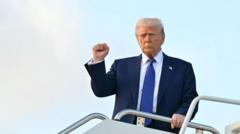In moments of historical relevance, certain years stand out, defined by transformative events that reshape global dynamics. The years 1968 and 1989 exemplified such times, marked by protests, invasions, and political upheavals that reverberated around the world. As we delve into 2025, just weeks in, we find ourselves on the precipice of another potential watershed moment, primarily influenced by the actions and policies of Donald Trump.
Since World War II, each preceding US president has adhered, at least nominally, to established geopolitical principles, emphasizing the importance of American security through global alliances, particularly with Europe against Russian aggression and Asia against the rise of China. Trump has decisively challenged this doctrine, proclaiming a prioritization of "America First," often gauging foreign engagement through a financial lens. This marked departure from established protocols is not just perplexing to allies, particularly in Europe, but it is also compounded by Trump's unique personal style, which some have likened to the self-obsessed Louis XIV.
Trump’s approach elicits a divided reaction among his followers and advisers such as Elon Musk and JD Vance, who appear to support his views through uncritical endorsement. This reflects a Trumpian environment where dissent is minimal, particularly regarding contentious issues like the ongoing Ukraine conflict. Trump's assertions, often unverified, about Ukrainian leadership reveal a troubling dynamic where his advisers seem more focused on acquiescing to his preferences rather than engaging in constructive dialogue.
Moving forward, Trump has vowed to seek a resolution to the Ukraine war before Easter, an ambition that coincides with Russia's tactical maneuvers in the region. This situation breeds concern amongst international observers who argue that acquiescing to Trump’s impulses at the negotiation table could inadvertently empower Russia, especially considering the potential for Ukraine to become cornered in negotiations.
The current geopolitical landscape is also characterized by the fragility of international alliances, with Trump's tactics living under a scrutiny not only at home but abroad. Diplomats from the UK and Germany express chagrin at the lack of leverage Trump employs during negotiations, particularly in light of Russia's current isolation.
Yet, as the political climate in the US shifts and 2026 midterm elections approach, Trump's expansive foreign policy initiatives could face considerable challenges. Economic indicators reveal rising inflation in America that could sway voters towards retribution against Trump's administration in upcoming elections. If Republicans lose control of Congress, Trump's unchallenged reign of influence could falter, potentially altering the trajectory of US foreign policy.
The possibility that the US might agree to conditions dictated by Russia regarding Ukraine represents a significant shift from traditional US diplomatic practices. Should this transpire, 2025 could indeed emerge as a landmark year, signaling a dramatic alteration in the global order with consequences that threaten to shape international relations for decades to come. The uncharacteristic dynamics of this potential shift elucidate a new reality where historical patterns may unravel, marking a new epoch in world history.
Since World War II, each preceding US president has adhered, at least nominally, to established geopolitical principles, emphasizing the importance of American security through global alliances, particularly with Europe against Russian aggression and Asia against the rise of China. Trump has decisively challenged this doctrine, proclaiming a prioritization of "America First," often gauging foreign engagement through a financial lens. This marked departure from established protocols is not just perplexing to allies, particularly in Europe, but it is also compounded by Trump's unique personal style, which some have likened to the self-obsessed Louis XIV.
Trump’s approach elicits a divided reaction among his followers and advisers such as Elon Musk and JD Vance, who appear to support his views through uncritical endorsement. This reflects a Trumpian environment where dissent is minimal, particularly regarding contentious issues like the ongoing Ukraine conflict. Trump's assertions, often unverified, about Ukrainian leadership reveal a troubling dynamic where his advisers seem more focused on acquiescing to his preferences rather than engaging in constructive dialogue.
Moving forward, Trump has vowed to seek a resolution to the Ukraine war before Easter, an ambition that coincides with Russia's tactical maneuvers in the region. This situation breeds concern amongst international observers who argue that acquiescing to Trump’s impulses at the negotiation table could inadvertently empower Russia, especially considering the potential for Ukraine to become cornered in negotiations.
The current geopolitical landscape is also characterized by the fragility of international alliances, with Trump's tactics living under a scrutiny not only at home but abroad. Diplomats from the UK and Germany express chagrin at the lack of leverage Trump employs during negotiations, particularly in light of Russia's current isolation.
Yet, as the political climate in the US shifts and 2026 midterm elections approach, Trump's expansive foreign policy initiatives could face considerable challenges. Economic indicators reveal rising inflation in America that could sway voters towards retribution against Trump's administration in upcoming elections. If Republicans lose control of Congress, Trump's unchallenged reign of influence could falter, potentially altering the trajectory of US foreign policy.
The possibility that the US might agree to conditions dictated by Russia regarding Ukraine represents a significant shift from traditional US diplomatic practices. Should this transpire, 2025 could indeed emerge as a landmark year, signaling a dramatic alteration in the global order with consequences that threaten to shape international relations for decades to come. The uncharacteristic dynamics of this potential shift elucidate a new reality where historical patterns may unravel, marking a new epoch in world history.



















